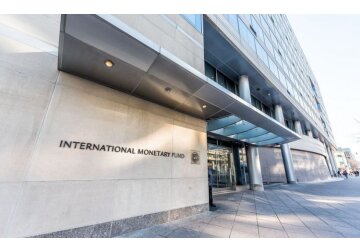
Moldova and the IMF mission agreed to complete the 4th review of the financing program and after approval of this agreement by the Executive Board of the fund, our country will receive a new tranche of $92 million.
In addition, Moldova plans to introduce a new 22-month RSF program, providing approximately $169 million in funding to support the implementation of the government's ambitious reform program to address climate change challenges. This was stated by the head of the IMF Mission, Clara Mira, upon completion of the work of the fund’s experts in our country during the period from September 25 to October 16. Based on the mission's preliminary findings, IMF experts will prepare a report, which, after approval by the fund's management, will be presented to the IMF Executive Board for discussion and approval. As noted in the IMF report, in particular, from September 25 to October 16, the IMF mission held discussions in Chisinau and at a distance with the Moldovan authorities in the context of the 4th review of the ongoing program of Moldova, financed by the IMF through the Extended Credit Facility (ECF) and the Extended Fund Facility (EFF) and the authorities' request for a program to be supported by the Resilience Facility (RSF), and held consultations in 2023 under Article 4 of the IMF agreement. At the end of the discussions, Clara Mira stated that the Moldovan authorities and the IMF mission had reached agreement at the expert level on the policy measures necessary to complete the fourth review of the program financed by the ECF and EFF mechanisms. The agreement must be approved by the IMF's management and Executive Board. Upon completion of the review, Moldova will be able to receive approximately $92 million, bringing the total amount of funds provided under the program to approximately $461.3 million. She noted that the program financed by the fund is being implemented generally successfully in Moldova, despite difficult circumstances. The authorities have met all quantitative program implementation criteria set at the end of June. Structural reforms are progressing well, including in the areas of fiscal management and financial sector supervision. Work continues to strengthen the system of anti-corruption institutions, including by ensuring the jurisdiction of the Anti-Corruption Prosecutor's Office over high-ranking officials for all corruption crimes and endowing it with sufficient powers and capabilities, and by creating an Anti-Corruption Court. At the same time, the consequences of the protracted war in Ukraine continue to affect the Moldovan economy, although slowing inflation and improved energy security have mitigated the rising cost of living crisis. It is emphasized that the growth of inflation slowed faster than expected, thanks to the adjusted monetary policy of the National Bank of Moldova and the sharp decline in food and fuel prices. International reserves continue to provide adequate protection against external shocks. Fiscal policy remained within agreed program parameters, although underspending continues to be a problem. Clara Mira noted that after the contraction of the Moldovan economy in 2022, a decline was also noted in the first half of 2023. However, by the end of 2023, a moderate economic recovery is generally expected, with GDP growth projected at 2%. Moldova's economic growth is expected to accelerate in 2024, driven by increases in agricultural production, consumption and investment. The outlook remains highly uncertain, with significant downside risks. Escalating war and repeated energy shocks could worsen future prospects. Herewith, progress in the EU accession process, a faster recovery of domestic demand and economic activity in countries that are Moldova's trading partners, could contribute to economic growth and increased confidence. Clara Mira emphasized that fiscal policy is aimed at mitigating the economic and social consequences of the war, while supporting economic recovery. The budget deficit, revised in October 2023, remains in line with the target agreed within the program. In 2024, budget parameters should be adjusted, taking into account, on the one hand, the growth of revenues, and on the other hand, the projected reduction in the volume of external grants. She said authorities must continue to develop contingency plans, ensure vulnerable populations are protected and prioritize infrastructure investment. Addressing budget underperformance is critical to supporting domestic demand through strengthening fiscal planning and public investment management. The Moldova Support Platform provides an opportunity to mobilize external assistance. Fund experts note that the current monetary policy remains adequate. Further policy easing should be conditioned by a decline in headline and core inflation. As the external environment remains unclear, the authorities intend to maintain a flexible exchange rate, intervening in the foreign exchange market solely to smooth out excessive market volatility and prevent market disruption. Moldova's financial sector remains resilient, with deposits above pre-war levels and banks maintaining sufficient capital and liquidity buffers. Reforms to strengthen the financial supervision system are progressing: the NBM is now also responsible for the regulation and supervision of insurance companies, non-bank credit institutions, savings and loan associations and credit bureaus. Work is underway to develop the capital market and increase the accessibility of financial services. The authorities' efforts to diversify energy sources, promote a comprehensive energy reform agenda, and prepare contingency plans have led to some reduction in risks. However, monthly electricity supply contracts and dependence on energy imports remain vulnerabilities. Work continues to advance reform of the public enterprise sector, which is a step towards improving sector performance and reducing fiscal risks. The 22-month RSF, with approximately $169 million in funding, is expected to support the government's ambitious reform agenda to address climate change. The RSF program will focus on improving the legal, institutional and financial environment to accelerate climate action (including climate-smart infrastructure and energy sector policies) and to mobilize green finance. // 17.10.2023 — InfoMarket.







